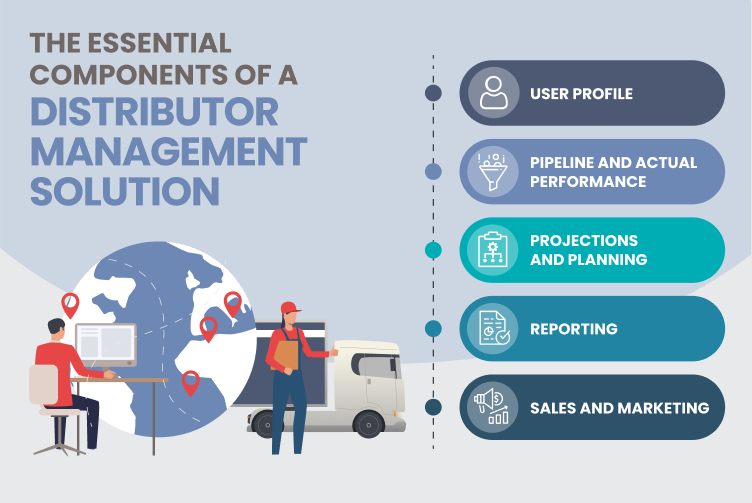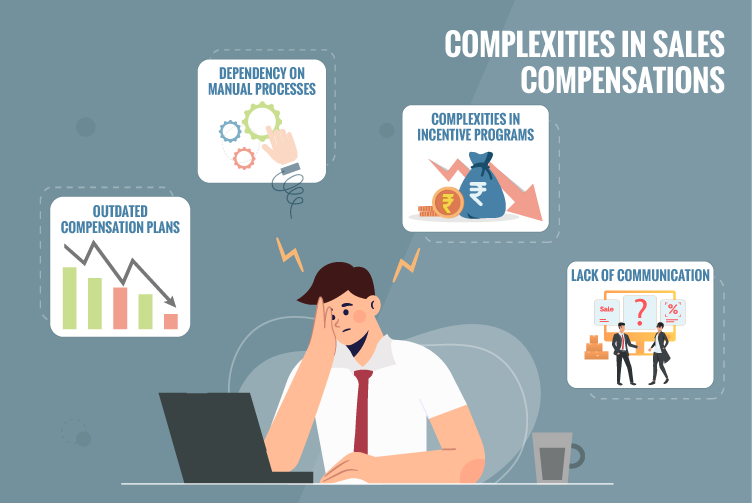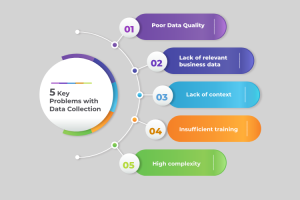Distribution networks become complex as companies go global.
Companies must manage various large and small distributors to ensure their products reach the outlets and consumers on time. They also must manage inventories, sales management, promotions and streamline all the activities involved in ensuring distributor performance.
But distribution networks are getting so complicated that companies have a tough time managing these activities. Also, given that they have limited data visibility and accessibility, they are often unable to make the right decisions at the right time. The most common impacts are dropping sales numbers and overstocking or stockouts. All the complexities make the entire process inefficient, ineffective, and expensive.
What companies need is a highly-functional and robust distributor management solution (DMS). Such a DMS digitizes processes and activities, such as sales and inventory management, and standardizes them to build a robust distributor network.
The DMS provides the companies with real-time data about distributors, helps settle their claims quickly, predicts the restocking requirement, and replenishes the stocks when required.
It acts as a one-stop platform for distributors to update their sales numbers, manage new opportunities, interact with consumers, and manage invoices.
There are plenty of distributor management solutions available in the market. Here are some essential components to look for while choosing the right solution.
Essential Components Of A DMS
- User profile
A good DMS will allow companies to create highly specific user profiles for all distributors. Companies deal with different distributors from various locations within and outside the country. They must ensure that the DMS supports multiple languages. Companies should provide authorized access to distributors to enter the purchase order, sales, inventory, and other details directly into the DMS. This will save the company’s time in extracting and collecting data from disparate systems. They will have access to real-time, centralized information in a single platform, which will help them track the sales and distribution process more efficiently.
- Pipeline and actual performance
The DMS must help companies and distributors monitor the pipeline and convert the leads into sales. They should be able to monitor the sales activities, measure the actual performance, and make informed decisions to improve sales. Do ensure that the DMS provides a clear vision of the pipeline and allows the distributors to monitor and update the deal’s progress and manage consumer conversations efficiently. They should be able to demonstrate their value to the company to build a deeper connection, and the company should be able to improve its sales and revenue.
- Projections and planning
Distributors are closely connected with the consumers and thus understand the consumer trends better. They can predict when a consumer is likely to churn or who would continue to stay loyal. They see the trends like which product or variant is in greater demand and which is failing to generate interest and update the company about it. The company can use this data to create sales projections, predict consumer demands, and plan future production and sales. They can plan the inventory based on consumer demands and ensure that the products are available and regularly replenished to prevent stockouts or overstocking. With the help of the DMS, the distributors can inform the company about the sales and consumer trends in real-time, and the company can plan for raw materials, production, distribution, and sales to achieve the projected sales target.
- Reporting
To make critical business decisions, companies and distributors need access to real-time data on consumer behaviour, market trends, sales, inventories, etc. They must have easy-to-use reports that provide specific and actionable insights on improving distribution and sales. A common data set can be used by different functions within the company for different purposes. For example, a sales head might need data to understand the sales orders. The management might use it to understand market trends. So, while choosing a DMS, ensure that it has an in-built drill-down reporting feature. A drill-down report will save the user’s time as they can select certain parameters to filter the comprehensive report and check data pertaining to them. The reporting component should be easy to use and visually rich to help consumers gain insights easily. It should allow the user to view the data at a granular and detailed level as per their requirement.
- Sales and Marketing
Sales are crucial for the company’s profitability. However, the distribution network is so fragmented that companies often have limited visibility on the specific elements that comprise sales. They do not have an accurate idea of distributor performance and profits. Companies need real-time information on the sales performance store-wise, region-wise, product-wise, and other critical metrics. These insights will help the company make informed decisions on distribution and reduce losses on inefficiencies. While choosing a DMS, ensure that it has a component to manage sales metrics in such granular detail. It should eliminate data silos and give the company an overview of consumer behaviour to make decisions that can help close more sales. The DMS should also provide distributors with access to the company’s latest sales and promotional materials and activities to equip them to close sales quickly.
Conclusion
Distributors deliver products far and wide. Trusted relationships with them are crucial. A good distribution management solution can foster that relationship of trust.
Evaluate the parameters carefully while investing in a DMS. A few factors to consider include:
- Usability: Ensure the DMS is user-friendly and customizable for all distributors i.e., users. The user should be able to use it independently.
- Cost-effective: It should fit the company’s budget.
- Accessibility: The DMS should be easily accessible across different channels and different devices.
- Security: The DMS should be secure as it would store critical company, consumer, and distributor data.
At Amshuhu-iSteer, we provide a one-stop distributor solution that empowers distributors to efficiently manage opportunities, sales, customers, and inventories and gives the C-Suite real-time information to take proactive actions to meet business goals. To know more about the solution, contact us.




